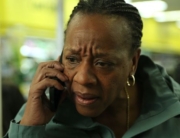
Native to sub-Saharan Africa, guinea fowls are large birds with blackish plumage. Besides mating for life, they are also known for traveling in packs and making noise. When they see a predator approaching, they shriek loudly to warn the rest of the group, helping protect themselves from being hunted.
Rungano Nyoni’s On Becoming a Guinea Fowl opens with a young woman, Shula (Susan Chardy), driving home from a costume party. She is dressed as a majestic, silvery guinea fowl with an alien-like sparkly headpiece. For a brief moment, she drives along to an upbeat tune. However, the ride home is cut short when she sees her uncle lying dead on the road. This discovery unites her with distant family members and ghosts from her past.
Shula immediately calls her father from her car. He appears unconcerned about Uncle Fred’s death, suggesting instead that Shula lock herself in the car and wait for the police—a sign of his passive approach to conflict. Soon after, Shula’s cousin, Nsansa (Elizabeth Chisela), arrives at the scene. Intoxicated and unpredictable, Nsansa initially seems like someone Shula would rather avoid. Shula hesitates to let her into the car, even as Nsansa bangs on the windows. However, as they try to decide what to do with their uncle’s body, Shula and Nsansa form a bond of solidarity, discovering they have more in common than they initially thought.
Nsansa is impulsive and intimidating at first, yet she speaks the truth in every situation, no matter how undiplomatic. Shula, on the other hand, is obedient and easygoing, someone who follows the rules and stays quiet during conflict.
After the initial setup, we are introduced to Shula’s large extended middle-class family gathering for the funeral. They belong to the Bemba tribe, a matrilineal, agricultural group in North Central Zambia. Aunties cry loudly and crawl on their hands and knees to send off their brother. As per tradition, they commemorate Fred by focusing only on his positive traits—speaking ill of the dead is taboo. The belief in spirits adds another layer of tension, as there is fear that they can haunt the living.
A clear divide emerges between the cousins and the aunts. The younger women find refuge in a pantry room, drinking beers and hiding from the rest of the family, who insist on remembering Fred as a beloved figure. While the younger group complains about their responsibilities in the funeral process, Shula’s compromising nature leads her to avoid certain rituals, such as refraining from bathing after a death or crying publicly for the deceased. Her refusal draws a scolding from her aunts.
Shula’s character grows beautifully throughout, ultimately becoming more active in protecting those around her, while the story effectively addresses difficult subject matter without victimizing its characters or turning them into villains. In a particularly powerful moment, the older women confront Uncle Fred’s past and seek forgiveness for failing to protect the younger women.
The role of ritual is crucial in understanding why the women insist on keeping certain secrets. The film’s ending includes a part of the funeral process where families gather to ask questions about the nature of the death and negotiate material settlements. The scene takes on a trial-like atmosphere, where the older women confront Uncle Fred’s teenage widow, Chichi (Norah Mwansa), illustrating hostility toward outsiders and the prejudice faced by younger women. The director creates a rich and intriguing world that reveals a fraught family drama through the lens of a specific community.
On Becoming a Guinea Fowl addresses difficult themes without resorting to extremes. The film avoids graphic depictions of past violence, making its emotional impact even stronger. As Shula, Chardy delivers a subtle yet powerful performance, expressing a wide range of emotions without melodrama while also landing comedic beats effectively. Meanwhile, the movie brilliantly critiques societal norms that sustain patriarchy and stifle women’s voices. Through her nuanced script, Nyoni proposes an alternative vision of an egalitarian society where women’s concerns are heard and understood: Shula’s journey points to how one can aspire to become like a guinea fowl—loud and unafraid to speak out.
















Sounds like a rich and complex drama that I have to now see.